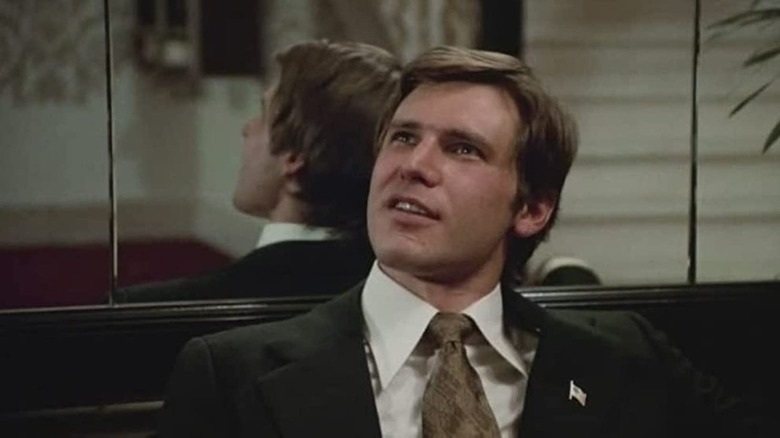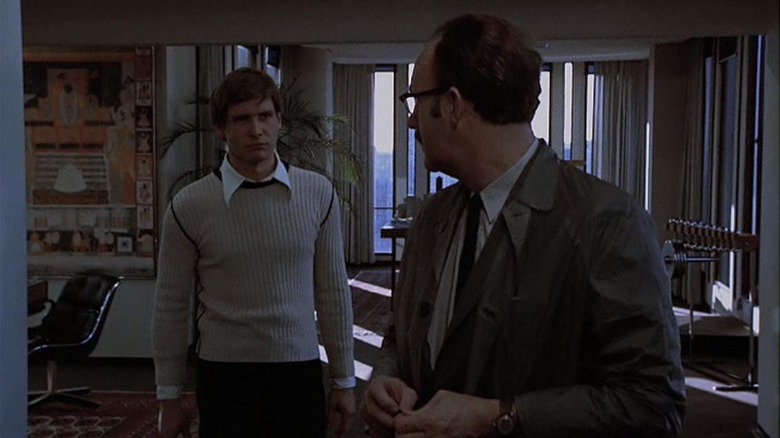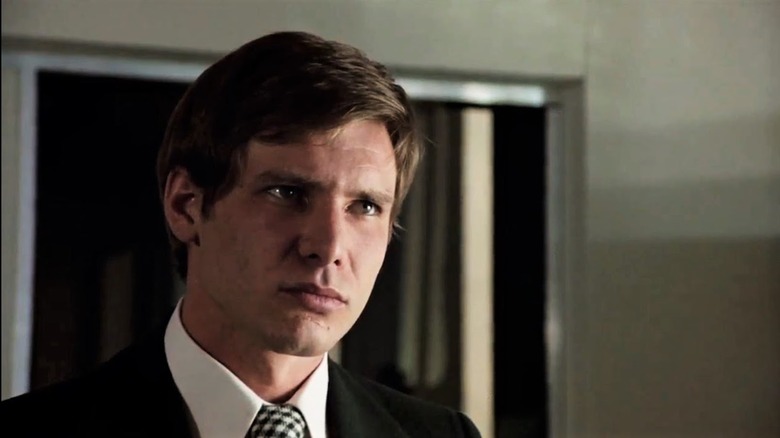Harrison Ford Surprised Francis Ford Coppola With A Major Change To His Character In The Conversation
Harrison Ford's pre-"Star Wars" years were rough for the not-yet movie star. He'd failed to pop as a member of Columbia Pictures' archaic New Talent Program, and, when the work proved less than plentiful in the late 1960s and early 1970s, took up carpentry to take care of his young family. Ford looked like the real deal in a headshot, but, when he stepped in front of a camera, he seemed disinterested in dialing up that movie star wattage he so clearly possessed.
Check out his screen debut in 1966's "Dead Heat on a Merry-Go-Round." All he has to do in the film is hand off a message to James Coburn (for whom, it turns out, the message is not intended). He briefly flashes that sly, million-dollar grin, but it vanishes the moment Coburn gives him the wrong name. He seems puzzled, wounded even, that Coburn's first name doesn't match up with that of the recipient's. In short, he overplays the moment like an eager-to-awe freshman hurling his all into his portrayal of the First Player in a college production of "Hamlet."
It's admirable in a way. Ford took his craft seriously. He wanted to make an impression, and he finally got his chance to do something truly interesting when he lost out on the significant role of Mark in Francis Ford Coppola's "The Conversation."
Ford goes the extra mile with a minor character
When Frederic Forrest landed the part of Mark, a seeming participant in an extramarital affair being monitored by paranoid snoop Harry Caul (Gene Hackman), Harrison Ford's rotten luck seemed to have cost him another shot at appearing in a high-profile film (and — sandwiched in between Francis Ford Coppola's releases of "The Godfather" and "The Godfather Part II" — it didn't get more high profile than "The Conversation"). Producer Fred Roos was taken with Ford, however, and lobbied Coppola to consider him for the as-yet-unwritten role of Martin Stett, the fastidious assistant of Caul's client.
Ford couldn't afford to decline, so he took the gig, and, just as he did in "Dead Heat on a Merry-Go-Round," invested his minor character with a rich inner life that was nowhere to be found on the page. According to Brad Duke's biography, "Harrison Ford: The Films," Ford decided Stett should be gay.
Daringly, Ford declined to alert Coppola ahead of time of his extratextual interpretation. He just showed up on set and sprung it on the Academy Award-winning director. How'd this play? According to Duke:
"Arriving on the set in a newly purchased $900 green flannel suit, Ford approached his director, who was hardly able to contain his astonishment. When Ford described his intentions to the bewildered Coppola, the director happily granted the actor permission to play his first screen homosexual. As a result, the office set was modified to better suit the film's latest personality."
A bold choice in an era of bigoted ignorance
While Harrison Ford was terrific as the hot-rodding Bob Falfa in George Lucas' "American Graffiti," that was an in-the-pocket role for the up-and-coming actor who wasn't opposed to raising the occasional hell. Stett is something else entirely.
Does he read as a gay character? Absolutely, if you know what you're looking for. There's nothing that's obvious or stereotypical in nature — it's an adroitly coded performance. Most importantly, his sexual orientation has nothing to do with Caul's dislike of him; he's plenty nasty regardless of who he goes to bed with.
In 2022, a straight actor playing gay would be frowned upon, but for a struggling actor eager for a leading-man break in 1974, Ford's portrayal of Stett was risky as hell. It also allowed a woefully underserved segment of the moviegoing public to feel seen in a small, yet satisfying way. I'm not saying Ford's Stett was anywhere near vital to the acceptance of gay characters in popular culture, but he was willing to represent the community in a non-cliched way at a time when it could've cost his career dearly. It was a pretty cool thing to do.


